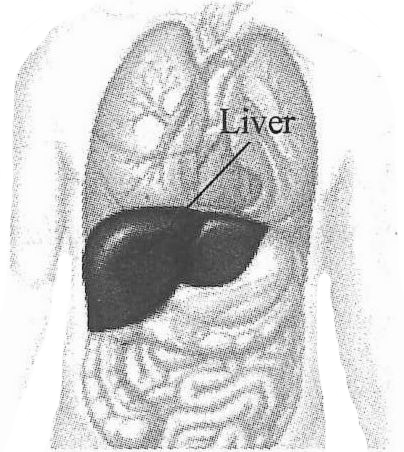
Fig. 4-1 The location of the liver
Text
Five viscera is a collective term for the liver, heart, spleen, lung and kidney. In meridian theory, pericardium is regarded as a viscus. Therefore, it is also called six viscera.
Every viscus has its own physiological characteristics; and physiological functions of all the viscera are interdependent, inter restraining, and coordinative, as described in the five-phase theory.* Each viscus is related to its corresponding bowel, body constituent, sense organ, and orifice, and five viscera are closely related with nature. Due to the limited space, only the liver is going to be introduced in this section. For more information, please log into the internet and find the following website.
The Liver
肝脏

Fig. 4-1 The location of the liver
The liver is an organ located in the right hypochondrium below the diaphragm (Fig. 4-1), which stores blood, facilitates the coursing of qi, and is closely related to the function of the sinews and eyes.
1. The Main Physiological Functions 主要生理功能
The main physiological function of the liver is to govern free coursing* and store blood*. The free coursing function of the liver ensures the free movement of whole body qi and prevents qi stagnation. The free coursing function of liver qi makes the qi of viscera and bowels, and meridians and collaterals move smoothly.
This function of the liver promotes the circulation and distribution of blood, fluid and humor. Without the free coursing function of the liver qi, the qi of viscera and bowels may become stagnant, and qi stagnation can lead to blood stasis or /and water retention. Free coursing function ensures digestion and absorption of food, regulates emotions, facilitates ovulation*, menstruation as well as semen* ejaculation. In reality, all viscera and bowels need qi to provide power for maintaining their functions, and all qi needs to be facilitated by the liver. Therefore, liver helps and promotes the physiological functions of all organs and tissues. Since seven emotions are generated and dominated by the qi of five viscera, the liver plays an important role in regulating emotions. The liver stores blood, regulates blood volume in the circulation and prevents bleeding. After blood is generated, one part flows in the whole body to nourish the tissues and organs, and the other part, the extra, flows into the liver to be stored, so as to be used when needed in the circulatory phase.
2. The Physiological Characteristics 生理特点
The liver governs upbearing and effusion, likes stretching end dislikes being depressed.* The liver belongs to the wood phase, corresponds to growing qi of spring in nature. Liver, like a tree in spring, is full of vitality and has the characteristics of leading qi upward and outward, facilitating qi dynamic in the body.* For this reason, when the liver suffers from any diseases, liver qi tends to be hyperactive.
Like a growing tree in spring, liver likes stretching out and being in a free environment. When a person is in a bad mood, the liver in that person will be first affected. Excessive anger may lead to the hyperactivity of liver yang; low mood may cause depression of liver qi*; persistent depressed liver qi may transform into fire*.
3. The Relations of the Liver with Constituents, Sense Organs, Wills, Humor and Annual Divisions 肝脏与形体、官窍、外显区志、液、时的关系
The liver dominates sinews and manifests in the nails, and opens at the eyes. Anger is its mind and tear is its humor, and it connects with the spring of the seasons. The condition of the liver blood usually is reflected in the nails. When liver blood is sufficient, the nails are bright and lustrous. The liver opens into the eyes and the eyes reflects its physiological functions and pathological conditions. Liver generates anger; it gives human beings the ability to feel anger. Normal anger does not hurt normal people. Yet, excessive anger impairs the liver as it can cause liver qi ascending counterflow. Liver qi hyperactivity can make the person be apt to anger while liver qi deficiency makes the person tend to be depressed. Liver opens at the eyes and tear is transformed by the liver. When liver blood is deficient, there would be deficient excretion of tears, causing dryness in the eyes; while dampness-heat in liver meridian can cause excessive tear secretion. The liver corresponds to the spring. Liver disorders may be improved in spring, because it derives supplement from the lesser yang qi* in the natural world. However, if wind qi is excessive in spring, there may be a disadvantageous impact on the liver, causing liver yang exuberance or even hyperactivity.